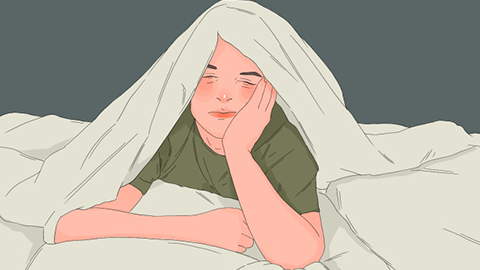What should I do if I have no sleepiness and can't fall asleep?
Generally, difficulty falling asleep without feeling sleepy may be caused by excessive stimulation before bedtime, irregular sleep schedules, neurasthenia, anxiety states, insomnia disorders, or other reasons. It is recommended to seek medical advice promptly, identify the underlying cause, and improve sleep under a doctor's guidance through lifestyle adjustments, medication, and other methods. Specific analysis is as follows:

1. Excessive pre-sleep stimulation: Using mobile phones, watching TV series, or drinking coffee before bedtime can keep the brain continuously excited and make it difficult to calm down. Turn off all electronic devices one hour before sleep, avoid consuming coffee or strong tea, and instead read a physical book or listen to soothing music to gradually relax the nervous system.
2. Irregular sleep schedule: Excessive daytime napping or inconsistent bedtimes disrupt the body’s circadian rhythm. Maintain a fixed time for going to bed and waking up every day. Even after a poor night's sleep, limit daytime naps to only 20 minutes, gradually adjusting the biological clock back to normal.
3. Neurasthenia: Prolonged mental stress leads to nervous overexcitability and fatigue, resulting in difficulty falling asleep and light sleep. Follow your doctor’s instructions when using medications such as Oryzanol tablets, Vitamin B1 tablets, or Anshen Bunao Liquid, and avoid thinking about complicated matters before bedtime to reduce nervous system strain.
4. Anxiety state: Persistent anxiety triggered by life stress causes racing thoughts that interfere with sleep. Patients should take prescribed medications such as Sertraline Hydrochloride tablets, Paroxetine tablets, or Lorazepam tablets, combined with 10 minutes of deep breathing exercises before bedtime to help calm anxious emotions.
5. Insomnia disorder: Long-term difficulty falling asleep and poor sleep maintenance significantly affect daytime functioning. Medications such as Zolpidem tablets, Zopiclone tablets, or Estazolam tablets may be used under medical supervision for short-term sleep improvement, along with cognitive behavioral therapy to consolidate long-term results.
In daily life, maintain a quiet and dark bedroom environment, and choose comfortable pillows and mattresses. Avoid heavy or greasy meals at dinner, and consider soaking feet before bedtime to promote blood circulation. By maintaining regular sleep habits and applying scientific adjustments, sleep quality can be gradually improved.









